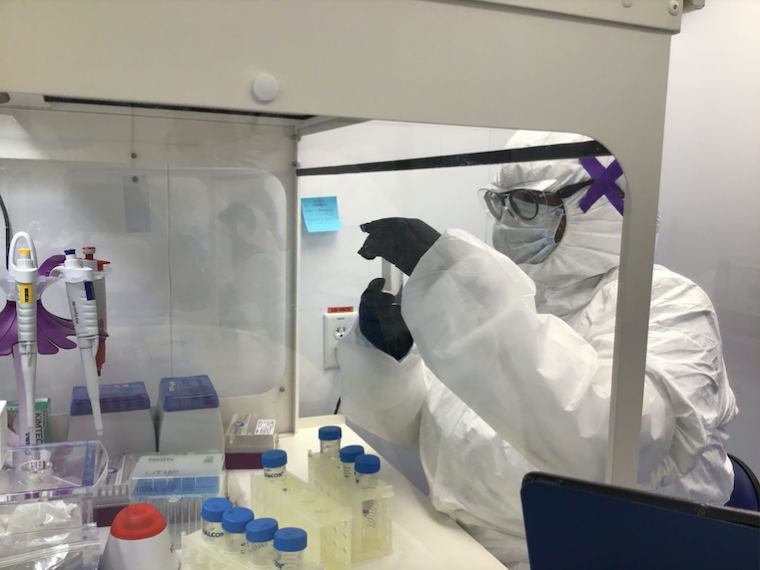Oberlin Science Scholar Explores Ancient DNA at Emory and Howard Universities
August 11, 2021
Yvonne Gay

Yemko Pryor ’17 conducts DNA extraction in the ancient DNA lab at Emory University.
Photo credit: Courtesy of Pryor
Yemko Pryor ’17, a PhD student at Emory University, has a long-term career goal that might one day help society scientifically understand the effects of racism and slavery on Black bodies.
Pryor is in Emory’s Genetics and Molecular Biology Graduate Program. The lab focuses on both molecular and computational aspects of ancient DNA research. Researchers there are interested in investigating molecular traits that may inform changes in human population density, social stratification, adaptations in agriculture, local pathogens, and changes brought on by European colonization.

Pryor is also collaborating on a project with Howard's Cobb Research Laboratory. The group is examining the genomes and epigenomes of individuals of African descent who lived between the antebellum and civil rights eras.
“I am very fascinated by the field of epigenetics and understanding how our environment impacts the way our genes are expressed,” explains Pryor. “My goal is to understand how the legacy of slavery and racism in the United States may have impacted the epigenomes of Black Americans who are descendants of enslaved people, and how even today our bodies are working to help us adapt and respond to white supremacy.”
An early passion for biology and history was transformed into a biology and Africana studies double-major when Pryor was a student at Oberlin College. While contemplating a career in medicine, she participated in the Oberlin Undergraduate Research [Symposium] and executed an honor’s thesis in Africana studies. The experience opened up a new side of expanded interests and helped solidify her goals of pursuing a career as an educator and a human genetics researcher.
As her interests in research grew, so did Pryor's involvement in the program. She worked in a neuroscience lab during her first summer in the Oberlin College Research Fellowship (OCRF) Program. As a leader in the Oberlin Workshop and Learning Sessions (OWLS) Program she worked with biology professors Yolanda Cruz, Michael Moore, and Mary Garvin In her senior year, Pryor served as an OWLS coordinator, worked in Garvin’s disease ecology lab, and served as secretary for the Black Scientist Guild. Pryor also supported her peers in the sciences as a registered tutor in beginning neuroscience and chemistry courses.
"I loved working with the OWLS program and know that without OWLS, I would not have done as well in my STEM courses," she says.
Once at Emory, Pryor explored ways to connect the disciplines she studied as an undergraduate by pursuing studies in ancient DNA, which she hopes will lead to work in the field of biological anthropology.

While she continues with her studies, Pryor is gravely aware of the lack of Black and Latinx women representation in the sciences, and encourages undergraduates to stay the course. She returned to Oberlin in 2019 to offer support by sharing her journey through STEM during a Black Scientists Guild symposium. She also met with a group of Winter Term students from Oberlin at Emory in 2020.
“Make sure to prioritize building some sort of community/support system,” she says to women who wish to pursue a career in the sciences. “Find people who you are comfortable going to for help or encouragement and stick with them. Stay in touch with previous mentors and don’t be afraid to reach out to them for literally anything. Know that much of the self-doubt you may be experiencing is likely due to Imposter Syndrome, and that you are way more qualified and capable than you may think.”
Pryor had many mentors in the Africana studies and biology departments at Oberlin, including Charles Peterson, Garvin, Meredith Gadsby, Pam Brooks, and Cruz.
“Taking classes with these scholars and getting the chance to work with them and talk to them one-on-one just excited me in ways I never felt before,” she says.
Members of the CLEAR office also “showed me how to get into research and provided resources and opportunities to participate in research,” she says. “They offered additional support to me as a Black queer woman in STEM, which motivated me to persevere and find ways to engage both myself and my community in research and STEM.”
Pryor is the recipient of several undergraduate awards that stem from her participation in the Annual Biomedical Conference for Minority Students while at Oberlin. She also received awards for academic excellence, artistic and community achievements from the Departments of Biology and Africana Studies. Most recently she was awarded the Laney Graduate School Centennial Scholars Fellowship from 2019 to 2024, and provided a grant from the University of Washington’s Summer Institute in Statistical Genetics.
You may also like…
Alli Roshni ’23 Awarded the Weidenfeld-Hoffmann Scholarship
Alli Roshni ’23 has been awarded the Weidenfeld-Hoffmann Scholarship, a prestigious award that covers her entire tuition fee for a master’s of science in global health science and epidemiology at the University of Oxford
Oberlin Provides Foundation for Future Education
Sherry Miao ’23, who majored in economics, is currently pursuing her master’s in public policy at the Harvard Kennedy School (of Harvard University).
Knocking It Out Of The Park
From studying economics to MLB coaching, Max Anastasio is paving his way with perseverance.


